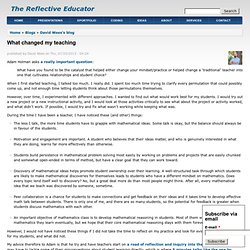

What changed my teaching by David Wees. Adam Holman asks a really important question: What have you found to be the catalyst that helped either change your mindset/practice or helped change a ‘traditional’ teacher into one that cultivates relationships and student choice?

When I first started teaching, I talked too much. I really did. I spent too much time trying to clarify every permutation that could possibly come up, and not enough time letting students think about those permutations themselves. However, over time, I experimented with different approaches. During the time I have been a teacher, I have noticed these (and other) things: The less I talk, the more time students have to grapple with mathematical ideas.
However, I would not have noticed these things if I did not take the time to reflect on my practice and look for evidence of what worked for my students, and what did not. My advice therefore to Adam is that he try and have teachers start on a road of reflection and inquiry into their own practices. Negative attitudes about math by David Wees.
Education Twitter Chats. Www.maa.org/devlin/LockhartsLament.pdf. Math. Are We Underestimating the Math Powers of Our Youngest Students?

New research questions if US math scores would improve if students were exposed to more complicated math early in their school lives. Continue Reading Could Calculus Be A Better Way to Introduce Kids to Math Than Arithmetic? Some educators are beginning to question the assumption that math is best taught in a linear sequence, focusing on patterns and structures instead of computations with elementary students. Continue Reading Math and Inquiry: The Importance of Letting Students Stumble.
Research. 2769: Math Wars. Today, math wars.

The University of Houston’s College of Engineering presents this series about the machines that make our civilization run, and the people whose ingenuity created them. The right way to teach math has been contentious for over one-hundred years. From the anti-math movement of the early twentieth century to the overly abstract new math of the sixties and seventies, educators haven’t been shy about speaking up. At the heart of the issue: should kindergarten through twelfth grade students be drilled on fundamentals, or should they be nurtured into discovering mathematical principles on their own? A recent incarnation of the debate began in 1989 with a set of standards issued by the National Council of Teachers of Mathematics.
Real World Math (Dan Meyer and stuff) I spent a really invigorating and exciting day at EdcampNYC on Saturday, surrounded by passionate, motivated, active educators.

I just want to thank everyone who came, especially the attendees at my session, Student Choice in the Classroom. The sessions were posted by people who could facilitate, but not necessarily in response to attendee interest, and some were left underwhelmed by the offerings. If I were designing EdcampBK, for instance, I would include a way for session requests – probably a quick and dirty version of class planning at PSCS. I just wanted to grab these underwhelmed adults and say, “see how boring stuff is when it isn’t what you want? That’s how our students feel everyday!” At the end of our student choice session, I had a conversation with a teacher about her daughter, who was very interested in becoming a math teacher. Math is so COOL! First of all, if she just wants the money, I get it. They’ve got that right! Here’s a better vision of real world math.